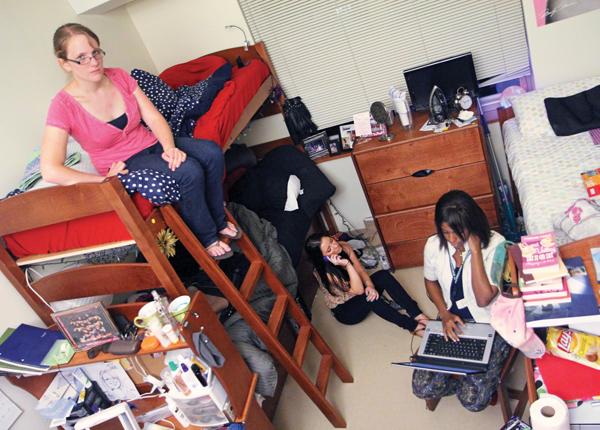
Some of the incoming freshmen at Binghamton University are currently being housed in “forced triples” — rooms designed as doubles but house three occupants — despite the opening of three large residence halls on the site of the old Newing College this fall.
A total of 225 new freshmen were placed in 75 standard double rooms this year, which have been fashioned to accommodate three people by replacing one bed with bunk beds.
Grace Hoefner, senior associate director of Residential Life, Housing and Crisis Management, said that this number is less than what it has been in previous years, thanks to the recent opening of the Newing buildings.
“We typically open the school year with triples,” Hoefner said. “Seventy-five is a relatively low number.”
The number of freshmen beginning the school year in forced triples peaked at 300 in fall 2008 and has since been on the decline.
According to a pamphlet Residential Life distributed to freshmen in forced triples, the housing shortage has many causes. The pamphlet explains that many more students are choosing to enroll in cheaper state universities like BU rather than expensive private schools due to the current economic downturn, creating a larger number of students who live on campus.
“In addition,” reads the pamphlet, “Binghamton joins with all universities and colleges in the nation when it accepts more students than can be accommodated based on the proven premise that not all those accepted will actually enroll. This year the number of students who accepted our offer of enrollment is slightly higher than we anticipated.”
Incoming freshmen were housed based on the date they turned in their housing applications on a first-come, first-serve basis. Tripling began when all other housing options were filled.
Mike Booher, a freshman majoring in political science, Sean Kelley, a freshman majoring in mechanical engineering, and Pallow Parajuli, a freshman majoring in mechanical engineering, are three students who now live in a forced triple in College-in-the-Woods’ Cayuga Hall.
Their room is the size of a standard double with a bunk bed along one wall and a regular bed along the other. Among the three of them, they share two dressers, two desks and two chairs. But the three are making the best of the situation.
“It’s nice having three people to live with. It’s just kind of rough if you get the bad bed,” Kelley said, referring to the top bunk bed, which is only a few feet from the ceiling. “And there’s not really enough space for our stuff.”
“But we’ve been making do,” Booher added.
Hoefner said these living conditions are temporary, and that it is the primary goal of Residential Life to put all students in correct-occupancy housing by the end of the semester.
“We are working on identifying vacancies and will begin to de-triple some of these rooms later this week,” she said. “We anticipate that all will be de-tripled by the beginning of the spring semester.”
After the start of the semester, students go abroad, drop out of school or sign up for on-campus housing which they do not wind up needing, without ever informing Residential Life. This week Residential Life begin locating vacant dorm rooms and moving freshmen currently in forced triples into them. The forced triple closest to a vacant room is the one that is de-tripled. The students in the triple are to decide who will move out.
Students who live in a forced triple receive credit based on the duration of their stay in the triple to reduce the charge of their housing fee. This credit can be redeemed as a refund or as money added to the student’s account.
There are plans to build more residence halls to further combat the issues of over-enrollment. The buildings that will form a new Dickinson Community are expected to open in fall 2013.


